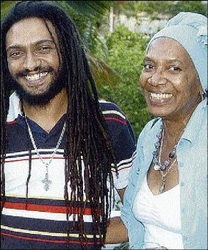
Winston Sill/Freelance Photographer
Makonnen Hannah and Barbara Blake Hannah
Title: Home: The first school - A home schooling guide to early childhood education
Written by: Barbara Blake Hannah
Reviewed by: Alfred Sangster
The author is known in the world of media for being an author, film-maker, former senator and an ardent advocate of the Rastafarian faith. The book is the story of an idea, demonstrated successfully by a woman about her own personal experiences of home-schooling her son, Makonnen.
I decided that it was important to meet both mother and son to get a closer glimpse of the home-schooled product. As we sat together on the benches at Devon House eating a patty and ice cream - the restaurant was closed for refurbishing - I met for the first time Blake Hannah's son. This 24-year-old young man was warm, friendly and respectful, confident in his Rasta locks and giving an impression of knowing what he was doing.
We must start at the beginning. Born to a 44-year-old woman who had undergone unsuccessful medical procedures, the child conceived after intense prayer and prematurely delivered, was in many ways a miracle baby. A song of joy at his birth and the response of the baby in the hospital led to the belief that the child could hear and understand what was being said.
A wonderful relationship
"I spoke to him as if he was a grown person, able to understand me perfectly." This was the beginning of a wonderful relationship of mother and child and was a significant feature of the home-schooling experience. The baby was breast fed for several years.
"Baby food made from cows' milk or other animals would promote development of intelligence only as great as that of the animal!" said Blake Hannah.
This radical idea was one of many that come through in this little book. The home-school experience was initially born out of economic circumstances and with a concern for the quality of the education that was offered in the traditional educational system.
Quite apart from the experiences of teaching Makonnen, the book is full of helpful ideas and references from those who are in the business of home-schooling, and who think outside the box. One major view that she shares from the book Growing up Gifted is that in the first three years of life, a child learns one-third of the information he/she will need for life. By the age of six years, the child has learned two-thirds of all the information he/she will need for life. Everything else will be the added extras.
What are some of the critical ideas that emerge from the home-schooling idea?
Books and the computer
Books and the computer were the most important tools that enabled Makonnen to grow and practise self-learning. The Internet became a whole new way of life.
The book is enriched with a chapter on the role of culture in education. The knowledge of the rich culture and history of Egypt provided a different - from the traditional Eurocentric - view of Africa. Reading lists and other helpful ideas keep the reader informed and educated.
Running like a scarlet thread through the book is the theme that education has to take a different path from the chalk and talk of the traditional classroom. The book represents a challenge to the educational system and discusses whether home-schooling is possible and could be considered for any young parent.
One essential life skill
The one really competitive skill for life that needs to be learned is the skill of being able to learn, and the computer can be a driving force in this important out-of-the-classroom experience.
The book ends with the extensive curriculum vitae of home schooled Makonnen. This bright and articulate Jamaican has walked the halls of the United Nations, prestigious institutions - Harvard, MIT, NASA, Microsoft and more. He has installed computer systems for schools and commercial companies, given speeches and won the Institute of Jamaica Junior Musgrave Award (2001). He is currently a music producer and composer. One senses that, in spite of his incredibly successful life, Makonnen still has some worlds to conquer.